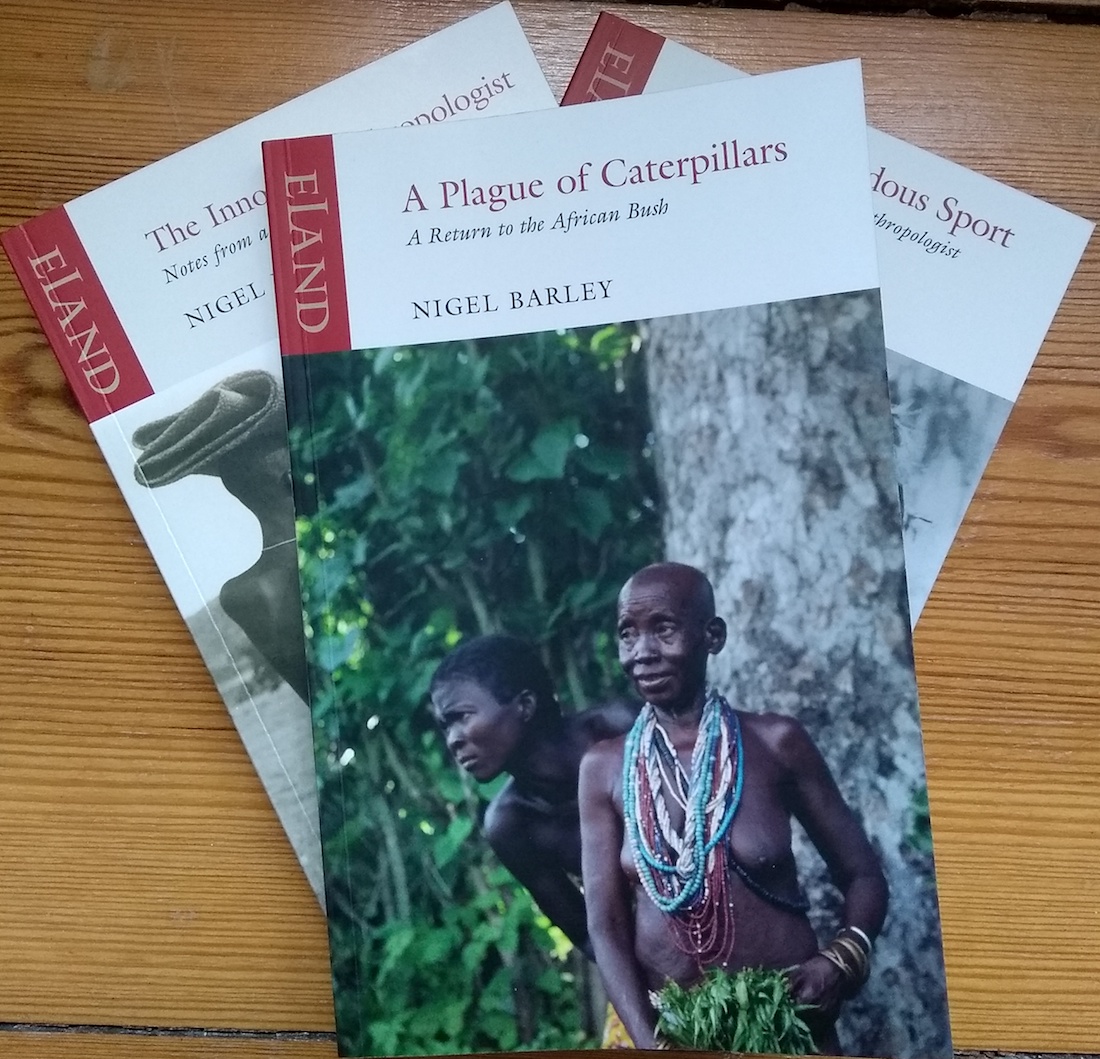
Nigel Barley returns to Cameroon in this hilarious follow up to The Innocent Anthropologist.
“Returns” is a bit of a misnomer. In truth, he’d only just left.
Barley spent 6 months in London upon completion of a year and a half of anthropological fieldwork among the Dowayo people, a group of mountain pagans. But he’d barely settled back into academic life when rumours reached him via the bush telegraph.
The Dowayo circumcision ceremony was going to take place. This ritual was the key to his research, and because it was only held at six or seven year intervals, missing this opportunity might be missing it forever.
And so the no longer innocent anthropologist plunged right back into the heat, frustration, bureaucracy and evasive circularity of African travel. But this time, with previous experience.
Apart from its crucial symbolic significance — as Barley revealed in the first volume of his trilogy, circumcision imagery seemed to form the heart of the Dowayo worldview — the ritual itself sounds completely excruciating. The penis was peeled for its entire length, resulting in predictably high rates of infection and mortality. But it is only through this rite of passage that male children become true men, able to swear oaths on their knives.
I’d be swearing on my knife, too, if someone took a dull blade to my…. Well, never mind. It’s best not to imagine these things too graphically.
Thankfully, you won’t have to picture penis peeling when you read this book.
On the contrary, you can expect the same calibre of hilarious encounters in A Plague of Caterpillars that had me laughing out loud with The Innocent Anthropologist.
You’ll join the hunt in the case of the missing male mastectomy. You’ll encounter a man who was lied to by his own foot. And you’ll brace yourself for a possible haunting by the ghost of the village shrew.
But my favourite story involved a close encounter of the simian kind. While discussing his peculiar attractiveness to mosquitoes, Barley confesses, “I have a yet stronger effect on monkeys. In England, this attraction remains latent. In Africa, it comes to the fore.”
After harassing guests at a hotel, this particular monkey, pursued by an enraged waiter, wraps its arms around Barley’s neck and refuses to let go. Any attempt to loosen its grip results in angry barks and bared fangs. Having already made firm plans for the evening, our narrator has no choice but to smuggle the creature into the cinema under his jacket, where it gets up to further monkeyshines.
Barley’s understated style is perfect for scenes like this, but he also strikes a serious note, and in this second volume he dispatches a few more of anthropology’s sacred cows.
The first is fieldwork. “[…] if an anthropologist does not like anything he encounters among an alien people, this is ethnocentrism,” he writes. “If he disapproves of anything, this is the result of bringing to bear the wrong standards.” The inverse is also true. And so ethnographic monographs in university libraries around the world depict the anthropologist “wallowing in unmitigated delight in the things he experiences.” The more unpleasant or alien, the better.
I can’t count the number of backpackers I’ve encountered on my travels who subscribe to very similar standards. You know the type. They go on and on about some village in the highlands where they were the only foreigner, where they couldn’t speak the dialect, and where they got ringworm and amoebic dysentery. They sit up all night arguing about who found the most “authentic” culture, and they think they’re terribly original. But everyone with a Lonely Planet is doing the same thing.
In another memorable scene, Barley encounters a black American anthropologist working in another remote village. Bob, as he’s called in the book, is the product of the next generation of social science.
“He had done something called “Black Studies” in an Eastern college,” Barley writes, and Bob “held the view that it was vital for coloured Americans to have an alternative cultural tradition that would assign them a higher place than did the white one.”
It wasn’t long before Cameroon shattered the illusions Bob had arrived with. “He never celebrated Christmas but an obscure festival of Swahili origin. He had been mortified to discover that Africans had never heard of it.”
Bob had also learned Swahili, which he imposed on his wife and children for one day each week. “Having never been informed otherwise and having assumed that Africa was in some sense a unity, he had been genuinely astonished that no one in Cameroon could speak it or had even heard of the language.”
Bob is eventually deserted by his wife and children, who return to the United States after one too many clashes over the asceticism he imposed on their lives. But what finally does Bob in is the markets. Fulani merchants rigged the local markets with such a tight monopoly and such excessive profits that his illusions had no choice but to confront reality.
“Having experienced all his life the hard school of deprivation under white domination, he found it difficult to cope with the notion that black Africans could oppress black Africans with equal fervour and complacency.” And so Bob breaks off his studies and returns to America, where he renews his dedication to Black Studies by setting up a programme on African literature.
Scenes like this are a reminder of why a book like A Plague of Caterpillars is still so relevant today.
As university campuses in the west are rocked by “social justice” inspired attacks on the Western canon and a traditional liberal education in favour of politically correct attempts to right historical wrongs, a hefty dose of fieldwork is sometimes all it takes to reconcile harsh reality with our overprotected Western lives. The real world is a lot more complicated than academia would have us believe.
Get your copy of A Plague of Caterpillars from Eland Books.

Get your FREE Guide to Creating Unique Travel Experiences today! And get out there and live your dreams...
